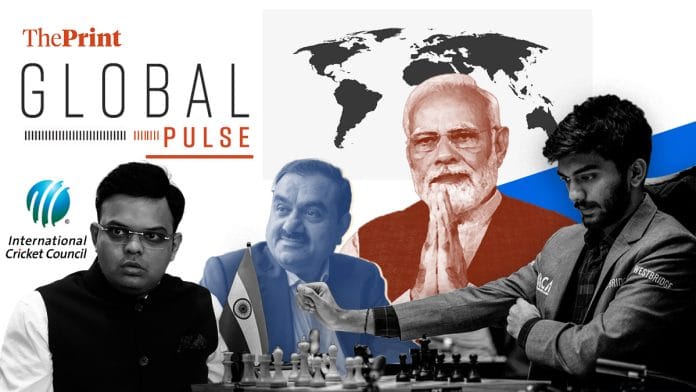New Delhi: Indian sports rules global headlines today, with international publications hailing the world’s newest and youngest chess champion, the 18-year-old Gukesh Dommaraju.
The BBC calls Gukesh the “Chennai prodigy”, who has “long been a superstar in the chess world”.
“The teenager comes from Chennai, a city known as India’s chess capital for having produced so many national champions. But there were no elite chess players in his family — he was enrolled in chess sessions after school because his father, a surgeon, and his mother, a medical professor, needed somewhere to put him.” the BBC reports. “The teenager has spoken before about how yoga and mindful thinking have helped him deal with the pressures of his chess career.”
Calling his victory a “stunning ascent to the pinnacle of chess”, The Guardian heaps praise on Gukesh while highlighting China’s Ding Liren’s “blunder”.
“Gukesh admitted he didn’t initially recognise Ding’s rook move (55 Rf2??) as a blunder, saying it took a few seconds to spot that his opponent’s bishop was trapped. He could barely conceal his excitement upon the discovery, while a devastated Ding could only bury his head in his hands,” the Guardian reports. “That Gukesh was even playing for the world title was a historic achievement.”
The Washington Post called Gukesh’s achievement a “dramatic victory” and a “triumph”.
“By defeating Ding, Dommaraju became the second world champion from India, following Viswanathan Anand, who first accomplished the feat in 2000 and has repeated it four more times. Anand, who also hails from the Chennai region, saw his 37-year reign as India’s top-ranked chess player end in 2023 when he was overtaken by Dommaraju,” the Post reports.
CNN reports that Gukesh has become the “youngest-ever undisputed classical chess world champion”, and India has become a “major chess powerhouse with a host of young talent storming onto the scene”.
The Economist reports on India’s favourite sport — cricket, of course — and how it is used for Indian diplomacy, echoing a recent National Interest column.
India wields cricket as an “active diplomatic tool” against Pakistan, writes The Economist, referencing the controversy over India’s refusal to send its team to compete in the Champions Trophy, which Pakistan will host.
“The decision has infuriated Pakistan,” the report says, adding that Pakistan, in turn, tried to aggravate India by threatening to take the tournament trophy on a country-wide tour, including Pakistan-occupied Kashmir.
The two sides have reached a compromise now — a “hybrid model” for the tournament, in which the ICC has allowed India to play in a neutral venue while other teams play in Pakistan.
“The sticky wicket is hardly surprising,” writes The Economist, adding that it reflects a broader deterioration in India-Pakistan relations. While cricket once played a conciliatory role, “cricket diplomacy” now “seems unthinkable.”
“Politics in India is much more nationalistic and cricket much more politicised,” explains the story. “Last week, the younger Mr Shah was elevated to manage the game globally at the ICC. The fear among many non-Indian cricket fans is that he will use his new job to further promote India’s interests — by pushing through the ‘hybrid model‘ for the upcoming Champions Trophy, for example. Under his watch, the BCCI took a hostile attitude towards Pakistan, mirroring the Indian government’s stance.”
The report concludes that more than foreign policy, India’s cricketing stance might be influenced by domestic politics.
It is the same conclusion other publications arrive at about the Indian government’s Adani stance in reports on the billionaire businessman this week, with The New York Times piecing together the links between the Adani Group and the Indian government, only to conclude “how deeply India’s ruling party sees its interests conjoined with Mr Adani’s”.
Calling the Adani Group a “symbol of India’s global soft power”, NYT reports how countries in Asia, Africa and elsewhere, of late, are distancing themselves from Gautam Adani after American prosecutors accused the conglomerate of bribery and conspiracy.
Kenya has publicly backed away from infrastructure deals with Adani, while Bangladesh and Sri Lanka have announced they are rethinking their deals. Paris-based European energy giant TotalEnergies, which has a 20 percent stake in Adani Green Energy, has said it will pause investment in new Adani projects. Downgraded by analysts, one of Adani’s biggest investors, Miami-based group GQG Partners, lost 13 percent of its market value overnight.
Adani is an “icon of corporate India” and the “face of Indian development around the world”, the NYT reports.
“The Adani Group frequently denies there is any blurring between its interests and India’s. But the perception abroad is consistent,” the report says.
The world, it seems, agrees with the Congress party — it sees Adani as hand-in-glove with the Modi government.
The Washington Post has a story on how Adani has withdrawn his request for a US-backed $533 million loan to build a terminal in a Sri Lankan port.
The American financing, it reports, was like an endorsement from the United States government, and the project came to be viewed widely as a joint effort by Washington and New Delhi to counter Beijing’s influence in the Indian Ocean. The loan would have been the US government’s highest infrastructural investment in Asia and its first funding of an Adani project.
The story quotes Michael Kugelman, director of the Wilson Center’s South Asia Institute, saying that the blow to the US “is more than symbolic. It is strategic in the sense that this really was an initiative that US officials saw as a way to meaningfully counter China’s own activities in terms of infrastructure investments in the broader region”.
Moreover, the US indictment of Adani is seen as an indirect attack on New Delhi and the Modi government. “Adani’s global ambitions — which have often followed in lockstep with Modi’s diplomatic ventures — have faced several setbacks since the Justice Department charges,” the Post reports.
(Edited by Madhurita Goswami)
Also Read: How Bangladesh hopes to renegotiate Adani power deal & ‘unending nightmare’ of Bhopal gas tragedy






